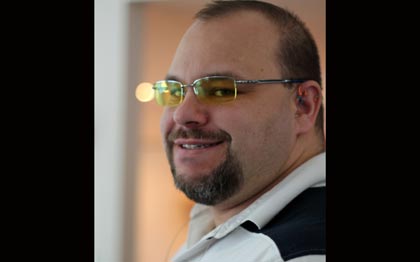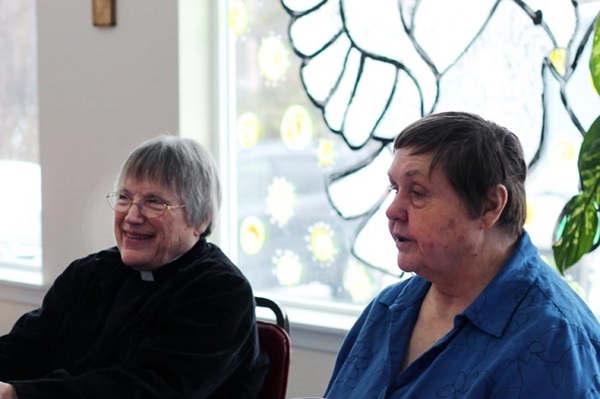What is the best way for communities to address such issues as lack of transportation for seniors and teens, access to healthcare for veterans and a need for affordable housing?
In Wasilla, Alaska – less than an hour’s drive from Anchorage – United Methodist and other churches are exploring congregation-based community organizing – shortened to CBCO.
The Rev. Robert Hicks, co-pastor of Christ First United Methodist Church, Wasilla, says the Valley Christian Conference (now VCC-CBCO) had observed how Anchorage Faith and Action Congregations Together addressed community issues using that model and decided it was worth a try.
Thanks to the annual United Methodist Peace with Justice Sunday offering, a United Methodist community organizer – Kelly Marciales – is leading the effort. In member churches from Willow to Palmer (over a 60-mile radius), she has conducted more than 100 visits with church members.
Marciales, who is also working on her deaconess certification, attends Christ First Church with her husband Caesar and their four children. “Kelly is coming alive in her faith,” Hicks says, “through her deaconess courses and through her good work in community organizing.”
Listening is the key, Hicks says. The CBCO model includes tools to train laity and clergy in listening more intently and embarking on a journey toward resolving community issues rooted in injustice. Two member congregations formed “local organizing ministry teams” within their churches.
“Through this one-to-one listening,” Hicks says, “community issues are repeatedly being raised which otherwise would not have been addressed. Once the local organizing ministry teams decide which issue is most immediate, they will begin meeting with those in authority to address these needs.”
 |
| Sky Stemmons participates in community organizing at St. David’s Episcopal Church, Wasilla, Alaska. While three United Methodist congregations are involved, initial organizing work has begun in one Episcopal and one Lutheran church in the Mat-Su Valley. Photo by Kelly Marciales. |
‘We can make a difference’
He offers an example, the St. David’s [Episcopal Church] Local Organizing Ministry, formed with eight people in November 2015. Two participants, Sky Stemmons and Episcopal Deacon Linda Riley, have led the one-to-one visits with their neighbors.
Through the CBCO training, Stemmons says, “I have learned that we can really make a difference. While building relationships within my community, I learned that some of the things I thought no one else cared about many did. I know we can make a difference. [CBCO] brings congregations together and encompasses the whole community, giving us a practical way to act out our faith.”
Riley has crisscrossed the borough, learning firsthand of the struggles of those who lack transportation in a community that has mass transit.
Before the training, she says, “I could only see small changes that we, as individuals, and our churches, as congregations, could make. Through my training, I see that we can empower ourselves and the marginalized in our communities [to] improve lives and provide opportunities in ways that I once thought could only be done by big money and big organizations.”
According to Hicks, the visits occur in two communities in the Mat-Su Borough, Palmer and Wasilla. Pastors also meet to discuss social justice issues and community organizing at quarterly clergy caucuses.
“Ultimately,” he says, “VCC-CBCO seeks to reweave the relationships that exist in the Mat-Su to include those who are marginalized and give them tools and opportunities so they may take a seat at the decision-making table on issues that affect them directly. By first building stronger congregations, then by building stronger neighborhoods, we will change the power structures that exist widely in the community, rebuild those structures and be intentionally inclusive in the process.”
‘Loving our neighbors’
Scripture guides every decision, Hicks asserts.
“Jesus tells us to love our neighbor as ourselves,” he says, “and, in our societies today, we are growing further and further apart. Central to this work is bring people back into community with one another. By listening to each other’s stories of joy and pain, struggles and successes, we can form new relationships in ways the traditional church or small-group study cannot provide.
“Beyond loving our neighbors is the call for a more just relationship with our neighbor. Power is often held by the perpetually powerful, while powerlessness is left for the margins. This leads to crime, abuses and falling out of church community.”
VCC-CBCO often connects those who have distanced themselves from the church body. “Local organizing ministry teams put their faith into action and do so publicly,” Hicks explains, “demonstrating to the community the power of Christ’s work through ministry teams comprised of marginalized people passionate about making a difference in the world.”
The annual Peace with Justice offering is vital to the ministry, he says. Because of United Methodist gifts, VCC-CBCO received a $5,000 grant in April 2015 to launch the organization and help fund Marciales’ ministry.
“Making a contribution to the Peace with Justice Sunday offering allows for work like congregation-based community organizing to be possible in rural communities such as ours in Alaska,” Hicks says.
“Unlike a direct service provider, VCC-CBCO provides training to 12 member congregations and their ministry teams. Those teams reach out to the broader community to listen to the needs of their neighbors. By valuing individuals, we can make lasting and systemic change to social injustices.”
Barbara Dunlap-Berg, general church content editor, United Methodist Communications
One of six churchwide Special Sundays with offerings of The United Methodist Church, Peace with Justice Sunday enables The United Methodist Church to have a voice in advocating for peace and justice through a broad spectrum of global programs. The special offering benefits peace with justice ministries in the annual conference and through the General Board of Church and Society.
When you give generously on Peace with Justice Sunday, you give The United Methodist Church a voice in advocating for global peace and justice. Give now.





